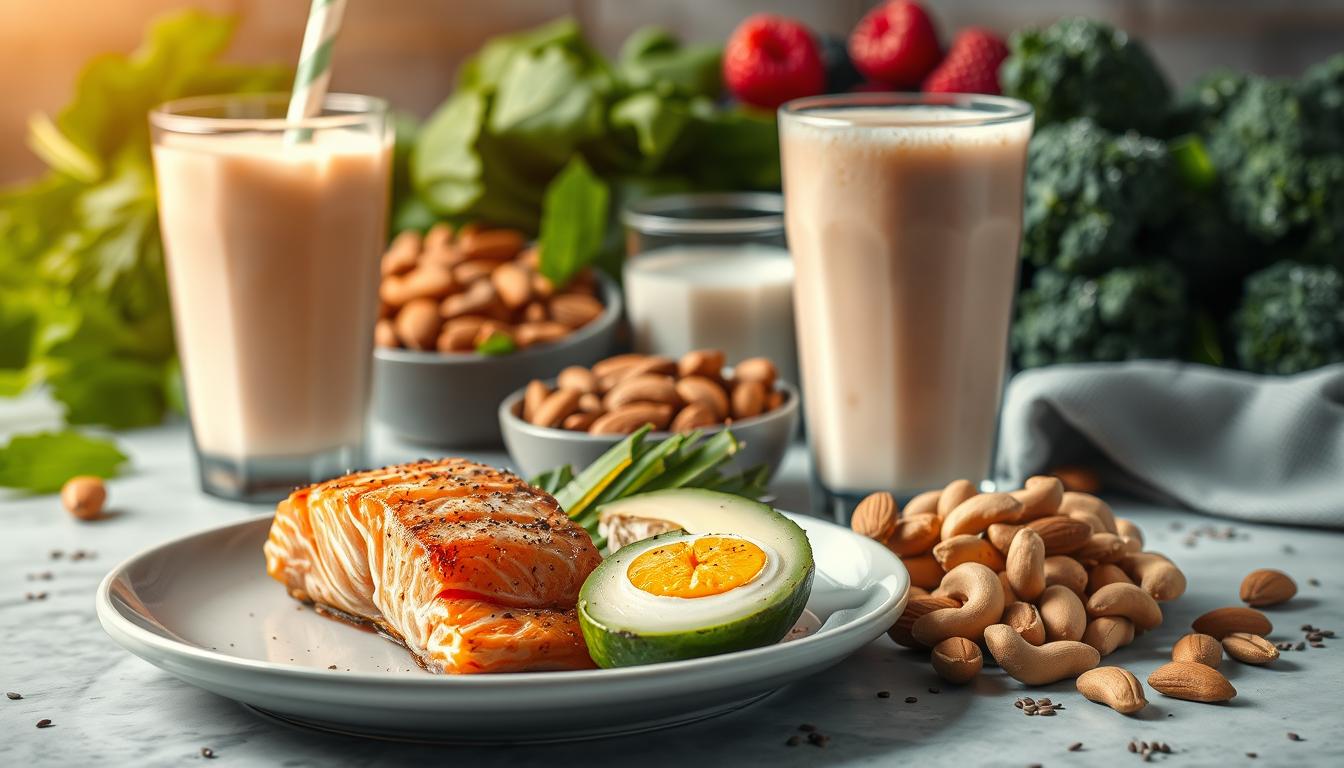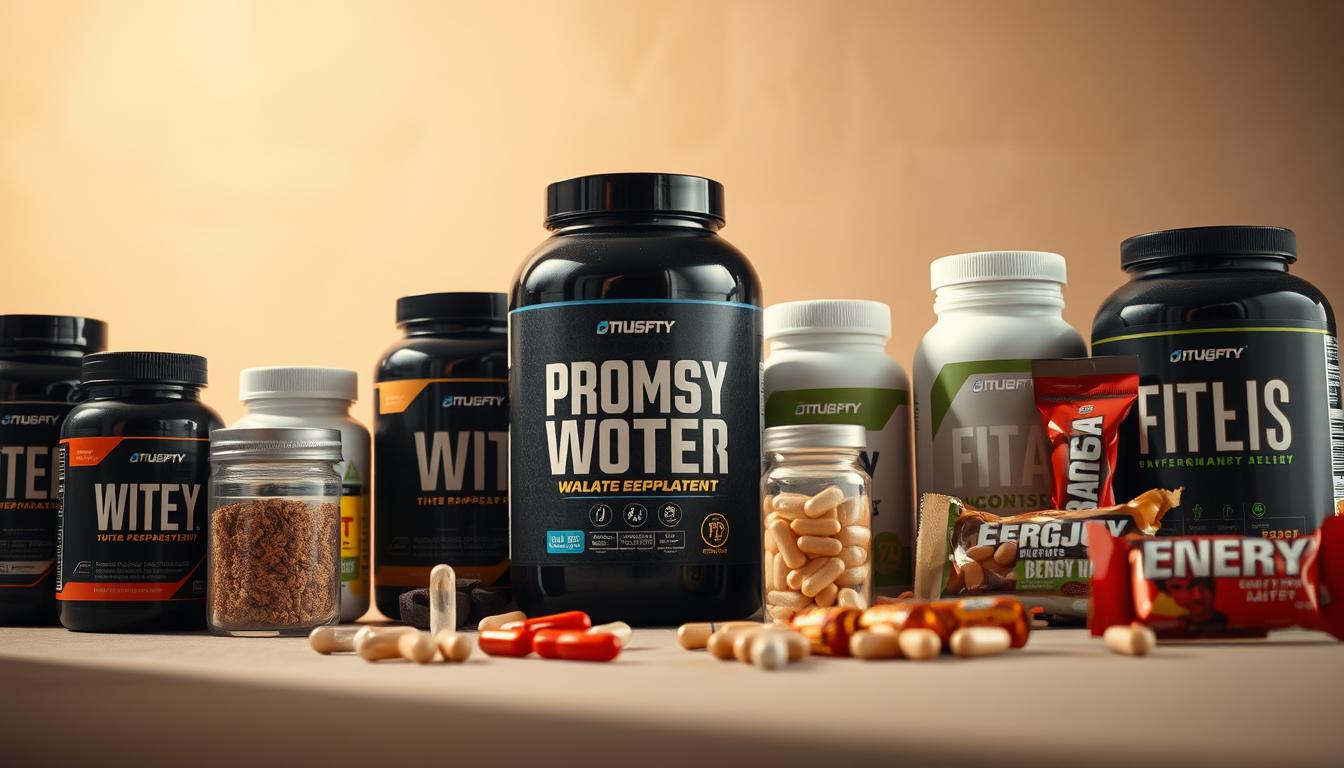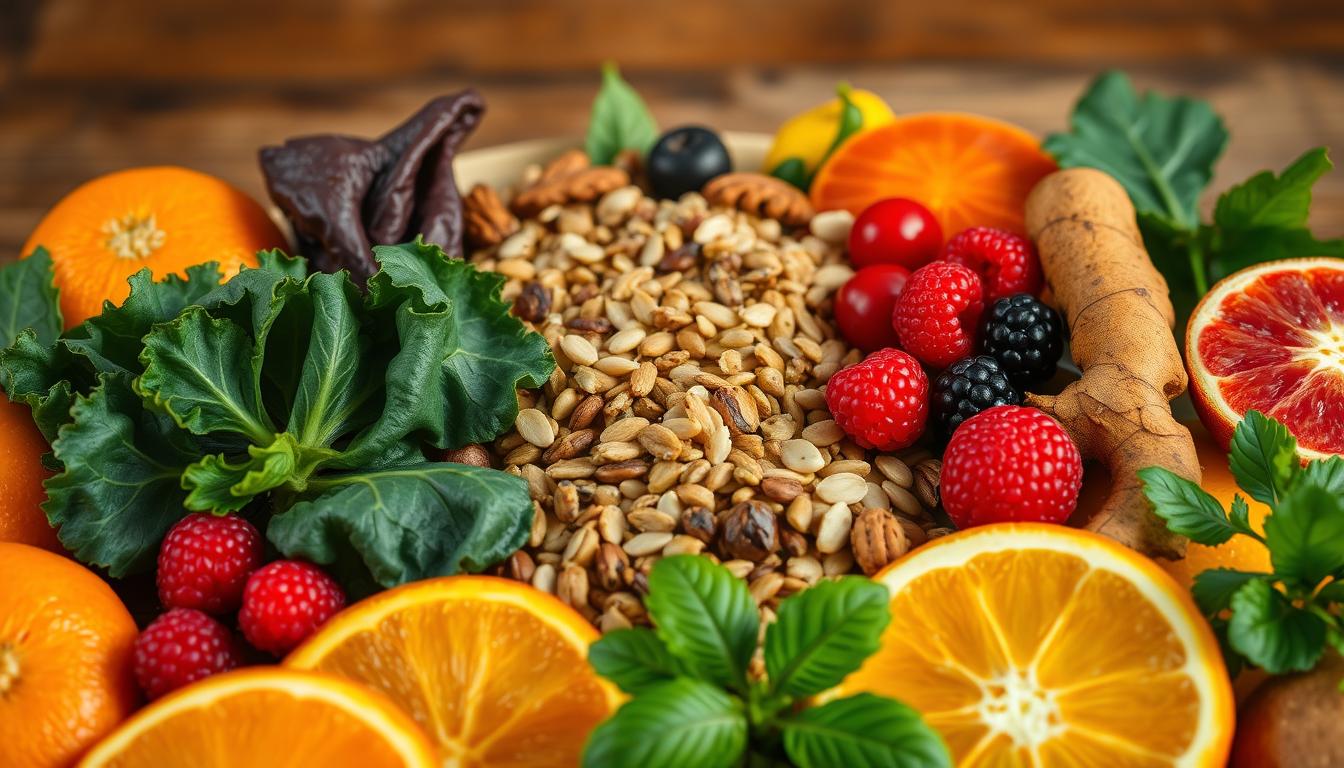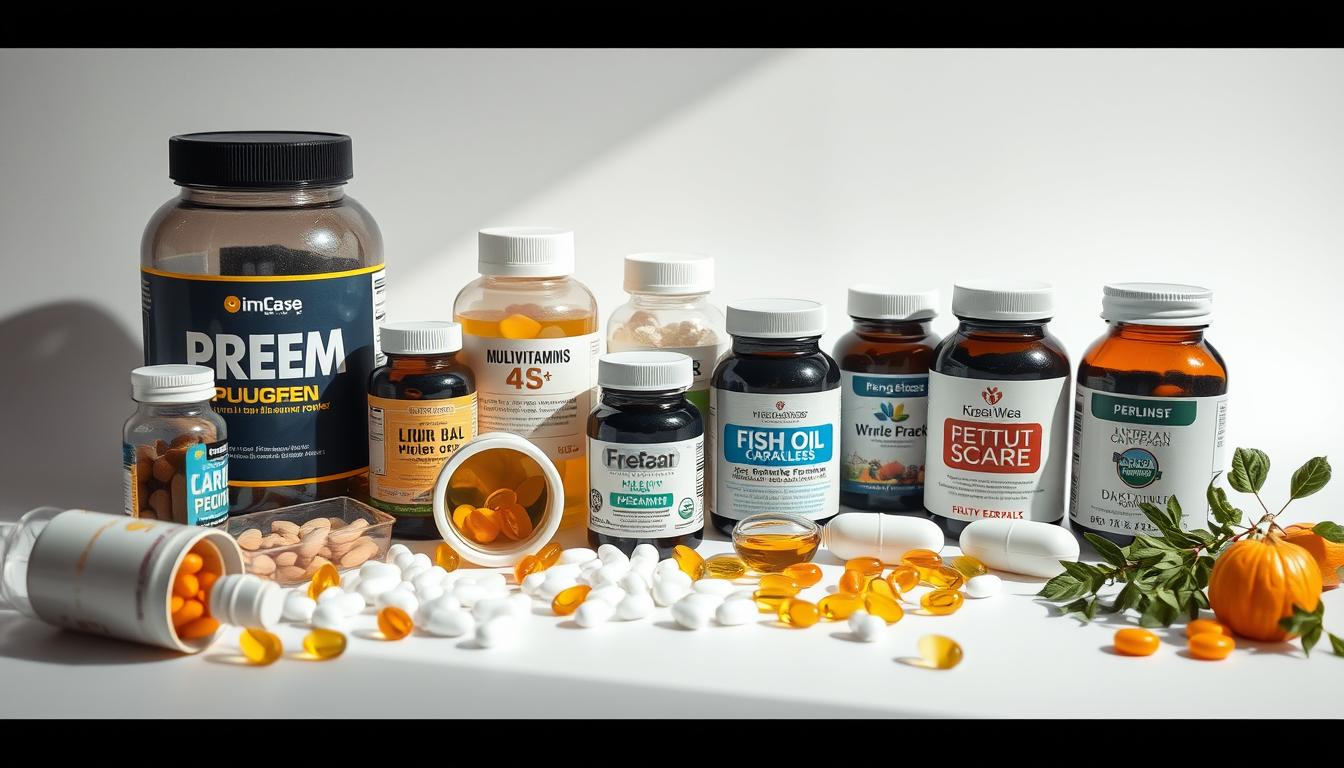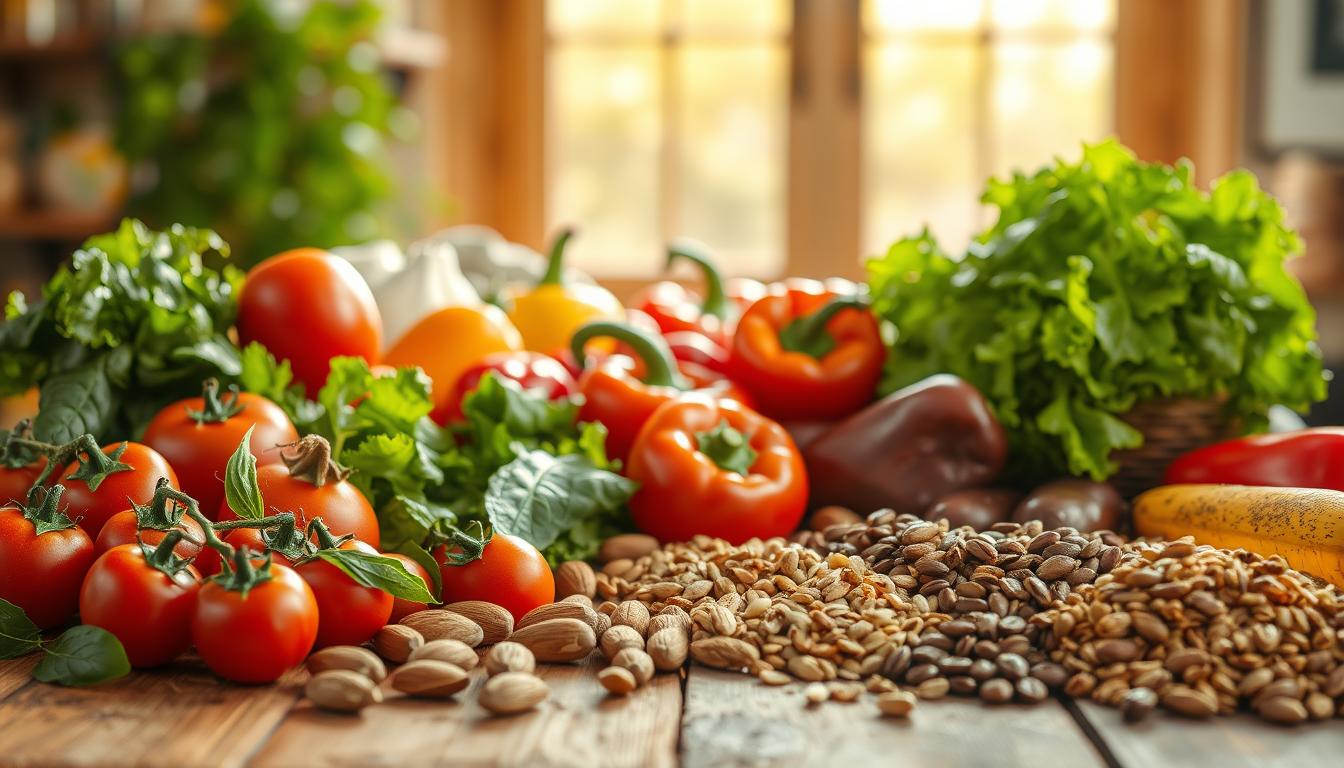After a tough workout, I often wonder what I can do to feel better and bounce back faster. The answer lies in what I eat. Choosing the right options can make a huge difference in how my body repairs itself and reduces soreness.
Nutrients play a key role in this process. For example, tart cherry juice is known for its anti-inflammatory properties. Fatty fish, rich in omega-3s, supports tissue repair. Whey protein, on the other hand, provides the building blocks my muscles need to recover.
Balanced nutrition isn’t just about recovery—it’s about performance too. When I fuel my body properly, I notice improvements in my workouts and overall energy levels. This article will explore how the right choices can enhance both recovery and performance.
Key Takeaways
- Post-workout nutrition is essential for repairing muscle tissue.
- Tart cherry juice reduces inflammation and soreness.
- Fatty fish supports muscle repair with omega-3s.
- Whey protein provides essential amino acids for recovery.
- Balanced nutrition enhances both recovery and workout performance.
Understanding Muscle Recovery and Nutrient Timing
Understanding how my body recovers after exercise has been a game-changer for my fitness journey. Intense physical activity, like weightlifting or running, causes tiny microtears in my muscle fibers. This is a natural process, but it leads to soreness and fatigue if not addressed properly.
Studies show that oxidative stress and inflammation play a big role in this process. For example, a study found that consuming the right nutrient source immediately after exercise can significantly reduce these effects. This is where nutrient timing comes into play.
How Exercise Impacts Muscle Tissue
When I push my body during a workout, it’s not just burning calories—it’s breaking down muscle tissue. This is known as exercise-induced muscle damage (EIMD). While it sounds negative, it’s actually essential for growth. My body repairs these microtears, making my muscles stronger over time.
However, without proper recovery strategies, this process can slow down. Research highlights that consuming amino acids and protein shortly after exercise can speed up repair. For instance, whey protein has been shown to reduce muscle soreness and improve recovery rates.
The Role of Timely Nutrition in Recovery
Nutrient timing is all about giving my body what it needs when it needs it most. A study on marathon runners found that consuming carbohydrates and protein within 30 minutes of finishing a race improved recovery and reduced inflammation.
Here’s why this matters:
- Protein provides the building blocks for muscle repair.
- Carbohydrates replenish energy stores, reducing fatigue.
- Antioxidants, like those found in tart cherry juice, combat oxidative stress.
By focusing on the rightnutrienttiming, I’ve noticed faster recovery and better performance in my next workout.
Key Nutrients for Muscle Repair
The right nutrients can make all the difference in how my body bounces back after a workout. Proteins, carbohydrates, and fats each play a unique role in repairing tissue and reducing soreness. Research shows that combining these macronutrients can enhance recovery and improve overall performance.
🌿 The Superfood Your Body Needs!
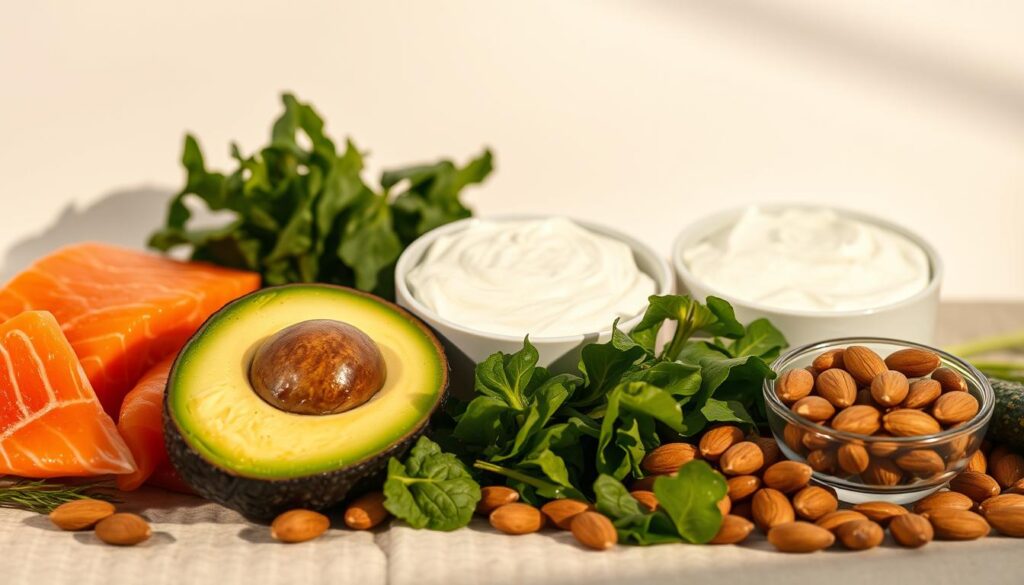
Essential Proteins, Carbohydrates, and Fats
Proteins are the building blocks for repair. They provide amino acids that my body needs to rebuild muscle fibers. Studies suggest that consuming protein shortly after exercise can reduce soreness and speed up recovery. Whey protein, for example, is a popular choice due to its high amino acid content.
Carbohydrates are equally important. They replenish energy stores and help balance muscle acid levels. Without enough carbs, I’ve noticed increased fatigue and slower recovery. Research highlights that pairing carbs with protein post-workout can maximize these benefits.
Fats, particularly omega-3s, play a key role in reducing inflammation. This is crucial for repairing tissue and preventing long-term damage. Fatty fish, like salmon, is a great source of omega-3s and has been shown to support muscle health.
Antioxidants also deserve attention. They combat oxidative stress, which can worsen soreness and delay recovery. Tart cherry juice, for instance, has been proven to reduce inflammation and improve recovery times. By combining these nutrients, I’ve experienced faster healing and better performance in my workouts.
Foods that help muscle recovery
Choosing the right post-workout options has transformed how I recover and perform. Specific nutrients can speed up repair and reduce inflammation, making a noticeable difference in my energy levels and overall fitness progress.
High-Protein Choices to Boost Repair
Protein is essential for rebuilding tissue after exercise. I’ve found that consuming 20 to 30 grams of protein within 30 to 60 minutes post-workout maximizes recovery. Eggs and dairy, like ricotta and cottage cheese, are excellent sources. They provide all nine essential amino acids, which are crucial for repair.
For example, cottage cheese contains nearly 3 grams of leucine per cup, a key amino acid for muscle growth. Eggs, with about 70 calories each, are another versatile option. They’ve been shown to reduce damage and support faster healing.
Antioxidant-Rich Options to Reduce Inflammation
Inflammation and oxidative stress can delay recovery. Antioxidant-rich foods like tart cherry and pomegranate juice have been game-changers for me. Studies show that tart cherry juice reduces soreness and inflammation, especially after intense workouts.
Pomegranate juice, on the other hand, boosts antioxidant defenses and lowers oxidative stress markers. I’ve noticed less fatigue and faster recovery when I include these juices in my routine.
Timing Matters
Nutrient timing plays a big role in effectiveness. Consuming protein and antioxidants within the first hour post-workout ensures my body gets what it needs to repair and replenish. Fatty fish, like salmon, is another great choice. Its omega-3s support tissue repair and reduce inflammation.
| Food | Key Nutrient | Benefit |
|---|---|---|
| Eggs | Complete Protein | Reduces muscle damage |
| Cottage Cheese | Leucine | Supports muscle growth |
| Tart Cherry Juice | Antioxidants | Reduces inflammation |
| Salmon | Omega-3s | Supports tissue repair |
By focusing on these options and their timing, I’ve seen a significant improvement in how quickly I recover and how well I perform in my next workout.
The Role of Protein in Accelerating Recovery
Protein has become my go-to solution for faster recovery after intense workouts. It plays a critical role in repairing and rebuilding fibers, which is essential for improving strength and performance. Research shows that consuming the right amount of protein post-training can significantly reduce soreness and speed up healing.
🔥 Energy, Health & Vitality with Moringa Magic!
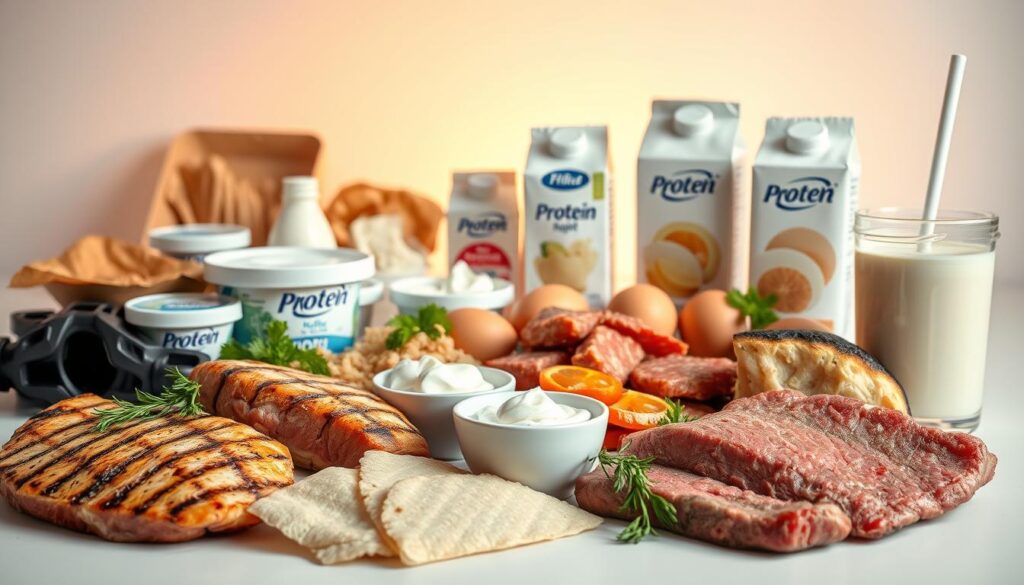
Whey Protein Shakes and Their Benefits
Whey protein shakes are a staple in my recovery routine. Studies suggest that consuming 20 to 40 grams of whey protein after exercise optimizes repair. This amount provides the essential amino acids needed to rebuild tissue and reduce damage.
For example, research highlights that whey protein can improve strength recovery by up to 50% within 24 hours. I’ve noticed less fatigue and better performance in my next workout when I include whey protein in my post-training routine.
Eggs and Dairy as Complete Protein Sources
Eggs and dairy are excellent alternatives for those who prefer whole foods. Eggs, in particular, are a complete protein source, providing all nine essential amino acids. Studies show that whole eggs are superior in quality compared to egg whites alone.
Dairy products like cottage cheese are also rich in leucine, a key amino acid for muscle growth. I’ve found that including these options in my meals helps maintain my strength and recovery levels.
- Whey protein shakes provide quick and efficient recovery support.
- Eggs offer superior protein quality and nutrient density.
- Dairy products like cottage cheese are rich in leucine, aiding muscle repair.
By focusing on these protein sources, I’ve seen a noticeable improvement in my recovery and overall strength. Timing is also crucial—consuming protein within the first hour post-training ensures maximum benefits.
Hydration and Its Impact on Muscle Recovery
Staying hydrated has been a game-changer for my post-workout recovery and performance. Water and electrolytes play a critical role in reducing soreness and restoring function. Without proper hydration, I’ve noticed increased fatigue and slower progress in my fitness journey.
Importance of Water and Electrolyte Balance
Water is essential for maintaining energy levels and preventing cramps during intense activity. Electrolytes, like sodium and potassium, help regulate fluid balance and muscle function. Studies show that even mild dehydration can impair performance by up to 10%.
For example, research highlights that losing just 2% of body weight through sweat can significantly reduce endurance. This is why I focus on replenishing fluids before, during, and after my workouts. Drinking water alone isn’t always enough—electrolytes are key to effective rehydration.
- Water supports energy levels and prevents cramps.
- Electrolytes regulate fluid balance and muscle function.
- Dehydration can impair performance by up to 10%.
Practical tips have made a big difference for me. I aim to drink 16 to 24 ounces of fluid within two hours after cooling down. This helps replace lost fluids and ensures my body has what it needs to recover. Monitoring urine color is another simple way I check my hydration status.
Proper hydration isn’t just about recovery—it’s about sustaining sport performance. By staying hydrated, I’ve noticed faster recovery times and better results in my training sessions. It’s a small change that has had a big impact on my fitness journey.
The Power of Carbohydrates and Healthy Fats
Incorporating carbohydrates and healthy fats into my meals has made a noticeable difference in my energy levels. These nutrients work together to replenish glycogen stores, reduce inflammation, and support overall recovery. By focusing on the right balance, I’ve seen improvements in both my performance and how quickly my body bounces back after intense sessions.
✅ Discover the Benefits of Moringa!
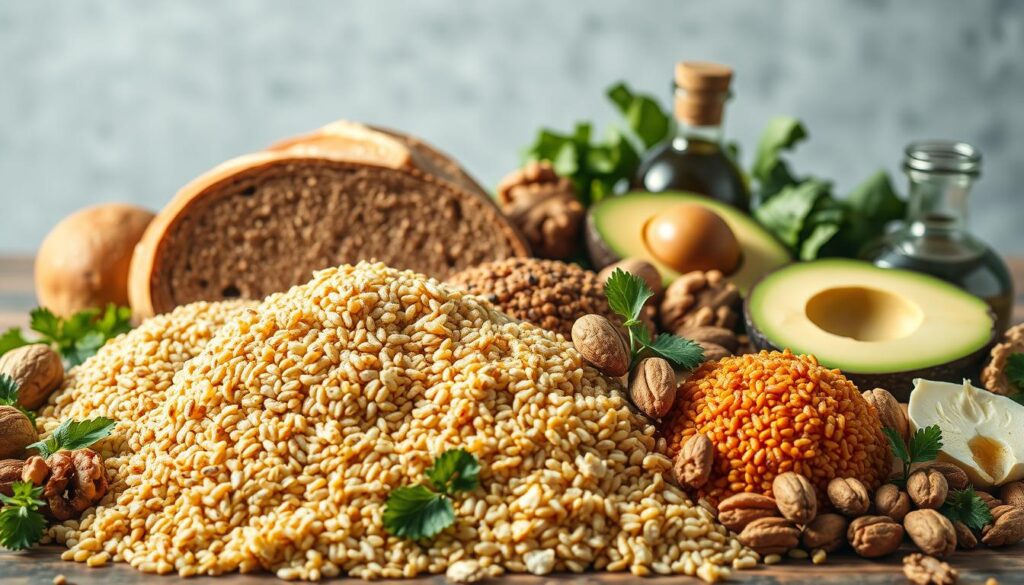
Starchy Vegetables for Energy Replenishment
Starchy vegetables like sweet potatoes and squash have become staples in my post-workout meals. They’re rich in complex carbohydrates, which help restore glycogen levels in my muscles. This is crucial for maintaining energy throughout the day and preparing for my next session.
Research shows that these vegetables also provide essential vitamins, like vitamin A, which supports immune function. For example, sweet potatoes contain more vitamin A than regular potatoes, making them a nutrient-dense choice. Including these in my diet has had a positive effect on my recovery and overall health.
Omega-3 Rich Foods Like Fatty Fish
Fatty fish, such as salmon and mackerel, are another key part of my recovery plan. They’re packed with omega-3 fatty acids, which reduce inflammation and support tissue repair. Studies suggest that omega-3s can improve neuromuscular function and reduce soreness after exercise.
For instance, salmon is not only rich in protein but also provides a significant amount of omega-3s. Including fatty fish in my meals has helped my body recover faster and perform better. It’s a simple yet effective way to enhance my fitness journey.
| Food | Key Nutrient | Benefit |
|---|---|---|
| Sweet Potatoes | Complex Carbs | Replenishes glycogen |
| Salmon | Omega-3s | Reduces inflammation |
| Squash | Vitamin A | Supports immune function |
By combining starchy vegetables and omega-3-rich foods, I’ve experienced a significant improvement in my recovery process. Consuming these nutrients throughout the day ensures my body has the resources it needs to repair and perform at its best. This balanced approach has become a cornerstone of my fitness routine.
Leveraging Natural Juices and Antioxidants
Natural juices have become a key part of my recovery routine after intense workouts. They’re packed with antioxidants, which help combat oxidative stress and reduce inflammation. This makes them an excellent addition to my diet for faster healing and improved performance.
Tart Cherry Juice: A Game-Changer for Recovery
Tart cherry juice is one of my go-to options for reducing soreness. Studies show it lowers inflammation and speeds up recovery after exercise. For example, research highlights that drinking tart cherry juice can reduce muscle damage by up to 20%. It’s a natural supplement that’s easy to integrate into my daily routine.
Pomegranate Juice: Boosting Antioxidant Defenses
Pomegranate juice is another powerful option. It’s rich in antioxidants, which help neutralize free radicals and reduce oxidative stress. A study found that athletes who consumed pomegranate juice experienced less fatigue and faster recovery. This makes it a great alternative to synthetic supplements.
Beet Juice: Enhancing Oxygen Delivery
Beet juice has been a game-changer for my endurance. It’s high in nitrates, which improve oxygen delivery to muscles. Research shows that beet juice can reduce the perceived effort during workouts and speed up recovery. It’s a natural way to enhance performance without relying on artificial products.
| Juice | Key Benefit | Research Insight |
|---|---|---|
| Tart Cherry | Reduces inflammation | Lowers muscle damage by 20% |
| Pomegranate | Boosts antioxidants | Reduces fatigue and speeds recovery |
| Beet | Improves oxygen delivery | Reduces perceived effort during workouts |
Incorporating these juices into my diet has been simple and effective. I drink them post-workout or blend them into smoothies for added convenience. They’re a natural, research-backed way to enhance recovery and performance. This approach has made a noticeable difference in my fitness journey.
Incorporating Recovery Foods into My Meals
Finding the right balance of nutrients after a workout has transformed my recovery process. By combining protein, carbohydrates, and healthy fats, I’ve created meals that are both delicious and effective. These recipes not only fuel my body but also make recovery feel less like a chore and more like a treat.
🌟 The Natural Secret to a Healthier Life!

Simple Post-Workout Recipes and Meal Ideas
One of my go-to meals is a recovery salad with roasted sweet potatoes, spinach, and grilled chicken. Sweet potatoes replenish glycogen, while spinach provides essential electrolytes. Adding a hard-boiled egg boosts protein intake, making this a well-rounded option.
For a quick snack, I often pair Greek yogurt with a handful of nuts. The yogurt offers protein, and the nuts provide healthy fats. This combination keeps me full and supports muscle repair. It’s a simple yet effective way to refuel after a workout.
Another favorite is a salmon and quinoa bowl. Salmon is rich in omega-3s, which reduce inflammation, while quinoa offers complex carbs. I top it with avocado for added health benefits. This meal is perfect for athletes looking to recover quickly.
- Recovery salad: Sweet potatoes, spinach, grilled chicken, and a hard-boiled egg.
- Greek yogurt with nuts: A protein and fat-rich snack.
- Salmon and quinoa bowl: Packed with omega-3s and complex carbs.
Experimenting with these ideas has helped me find meals that suit my routine and goals. Whether you’re an athlete or just starting your fitness journey, these recipes can make recovery easier and more enjoyable.
Research-Backed Nutritional Strategies for Athletes
Exploring the latest research on athlete nutrition has reshaped how I approach recovery and performance. Studies consistently show that the right balance of nutrients can significantly enhance recovery and improve overall results. By focusing on evidence-based strategies, I’ve been able to optimize my activity levels and achieve better outcomes.
Insights from Recent Studies and Expert Advice
Recent research highlights the importance of carbohydrate intake for replenishing glycogen stores. For example, consuming 1-1.2 g/kg of carbohydrate within the first hour post-training can speed up recovery. This is especially crucial for high-intensity activity where glycogen depletion is common.
Protein timing is another key factor. Studies suggest that consuming 0.3 g/kg of protein immediately after exercise maximizes muscle repair. Whey protein, in particular, is effective due to its high leucine content, which stimulates muscle protein synthesis.
Experts also emphasize the role of hydration. Replacing fluids lost during activity is essential for maintaining performance. Drinking 1.0-1.5 L of fluid for each 1 kg of body mass lost ensures proper rehydration.
How I Apply These Findings to My Training
Incorporating these strategies into my routine has been transformative. I focus on consuming a balanced meal within 30 minutes of finishing my workout. This typically includes a mix of carbohydrates, protein, and healthy fats to support recovery.
For example, I often pair a whey protein shake with a banana or sweet potato. This combination provides the necessary nutrients to replenish energy and repair muscle tissue. I also prioritize hydration by drinking water with added electrolytes during and after my activity.
Tailoring these strategies to my specific needs has made a noticeable difference. By following research-backed nutrition guidelines, I’ve seen improvements in my recovery time and overall performance.
| Nutrient | Recommended Intake | Benefit |
|---|---|---|
| Carbohydrates | 1-1.2 g/kg post-workout | Replenishes glycogen |
| Protein | 0.3 g/kg post-workout | Supports muscle repair |
| Fluids | 1.0-1.5 L per kg lost | Maintains hydration |
Conclusion
Optimizing my post-workout routine has been essential for achieving better results. Combining protein, carbohydrates, healthy fats, and hydration supports growth and reduces soreness. Scientific studies highlight the benefits of milk and natural juices in speeding up recovery.
Balanced consumption of these nutrients ensures my body gets what it needs to repair and perform. For example, milk provides a mix of protein and carbs, while tart cherry juice helps reduce inflammation. These strategies have made a noticeable difference in my fitness journey.
I encourage you to experiment with these tips and adopt evidence-based nutritional approaches. Thoughtful nutrition is key to long-term training success and achieving your best results. By focusing on the right nutrients, you can enhance recovery and performance effectively.
FAQ
How does exercise impact muscle tissue?
Why is timely nutrition important for recovery?
What are the key nutrients for muscle repair?
Which high-protein foods boost muscle repair?
How do antioxidants help with recovery?
Are whey protein shakes effective for recovery?
Why is hydration important for muscle recovery?
How do carbohydrates aid in recovery?
What are some omega-3 rich foods for recovery?
Can natural juices help with recovery?
How can I incorporate recovery foods into my meals?
What do recent studies say about nutrition for athletes?
Did you like this article? See also: Best Natural Supplements to Increase Muscle Mass for Men

